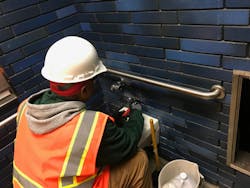BART uses coronavirus downtime to continue improving its system
The Bay Area Rapid Transit (BART) is continuing work to improve its system and rebuild aging infrastructure during the coronavirus pandemic.
BART crews have been coming to work to continue their capital projects. With extremely low ridership and new 9:00 pm service closure, capital workers are taking full advantage to make progress.
Capital projects are not paid for by operating funds, meaning the 90 percent ridership dip (visit BART’s website to see a detailed chart of the ridership decline from the past four weeks) and related revenue loss have not impacted infrastructure work. Many capital projects currently at work are paid for by Measure RR, a voter-approved bond measure passed in 2016 in the three BART District counties.
Several major capital projects are benefiting from the 9:00 pm service closure, such as 19th Street Station Modernization Project; El Cerrito Del Norte Station Modernization Project; rail grinding; rail replacement; and Transbay Tube Cathodic Protection, among others.
At 19th Street Station, crews were demolishing the long-closed restroom in the station last week to remodel the restroom and re-open it. The modernization project includes re-opening renovated underground station restrooms, upgrading station lights, reconfiguring the concourse, installing a platform elevator and repairing flooring and wall tiles, among other changes.
At El Cerrito del Norte Station, crews were doing electrical work at El Cerrito del Norte late Friday night, taking full advantage of the 9:00 pm closure. The station's modernization project includes new LED lighting throughout, installation of two new elevators, a new restroom and public art. The work is projected to be completed by the end of 2020.
At the unopened Milpitas Station, BART elevator and escalator foreworkers were working this past weekend on preparing the station's new elevator and escalators for service.
At Civic Center Station, crews installed a new step chain in an often-used escalator at Market and 8th St.
BART has also added additional weekend track work to help take advantage of an extremely low ridership. Typically, BART does one track work per weekend as to limit delays. Last Sunday's ridership was 9,453 riders, representing a 90 percent drop compared to an average Sunday in February 2020. BART had track work taking place in two different locations on Sunday: a cable trough installation between Orinda and Lafayette, and a track replacement between South Hayward and Union City.
BART says feedback on social media to the crews working on capital projects has been very positive.
"This is a damn smart use of available time with what resources you have," said one tweet. "After shelter-in-place, at least one piece of our critical infrastructure will be in better shape than we left it."
"The 1989 earthquake, the Great Recession, now this pandemic, BART has always been there to keep the Bay Area afloat," said another tweet. "Thanks BART and BART workers for everything. It’s not an exaggeration to say we would be nothing without all your work."
With a continuing shelter in place order in BART's service counties, BART has been preparing for operating revenue impacts. Estimated revenue impact projections for the full month of March is a loss of $24.660 million with a loss of 5.88 million trips, according to a presentation to the BART Board in a special meeting March 26.
BART budget staff is waiting to find out how much money BART will receive from the federal stimulus package -- of which $25 billion was allocated for transit systems across the United States -- to help support the operating budget and running service. BART says approximately $1.3 billion provided to the Metropolitan Transportation Commission will be divided up among Bay Area transit operators, including BART.
As part of reducing operating costs, BART has moved 200 maintenance and engineering employees from operating projects to rebuilding capital projects.
